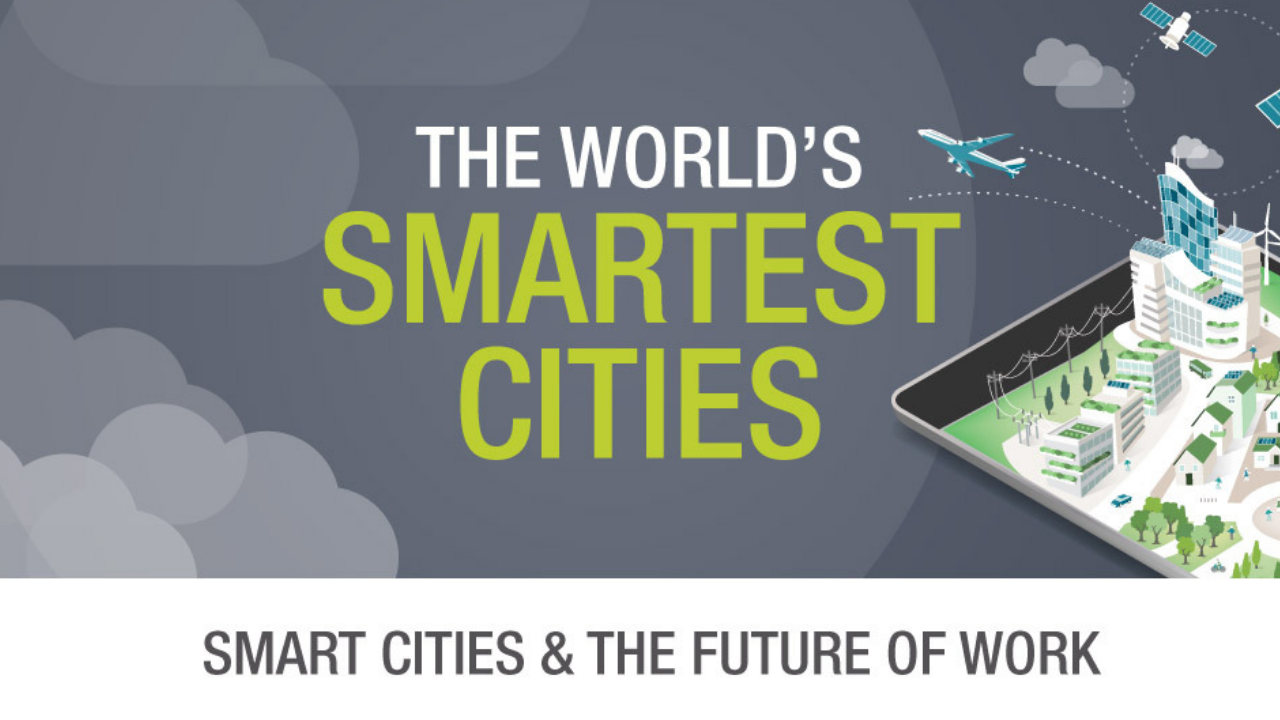As the world becomes increasingly dependent on technology for efficiency and success, a report by IDC shows an estimated two-thirds of global cities will be investing in smart city technology by up to $135 billion by 2021.
July, 2019 – As cities around the world are set to transform into ‘smart cities’, John Williams, Head of Marketing at Instant Offices, looks into what smart workplace trends are emerging from these innovation hubs.
The National League of Cities (NLC) has analysed how technological advances in smart cities could potentially impact jobs and skills, showing which jobs that are set to grow between now and 2026 are most likely to be automated. The research found that management and supervisory roles are the most secure, being less than 30% automatable, while low-paying positions involving manual labour are the ones most at risk, being more than 70% automatable.
The World’s Smartest Cities
Singapore:
ABI’s Smart Cities Competitive Assessment report has named Singapore as the world’s leading smart city. The innovative city is pioneering several projects to address high-density urban living and is also home to futuristic driverless taxis and shuttles.
Dubai:
The ultra-modern city of Dubai was ranked second, noted for its adoption of disruptive next-gen technologies. Dubai is leading the way when it comes to crypto technology, with all government transactions set to be processed via blockchain by 2030.
London:
The English capital has been placed third, thanks to its advanced open data policies and thriving start-up ecosystem
Top Smart Office Trends for 2019
As smart cities are shaping the future of work, here are the leading workplace trends for 2019 and beyond:
BYOD (Bring Your Own Device):
Many businesses are now allowing a BYOD policy, which means employees can use their own personal tablets, smartphones, laptops and wearable tech to complete their tasks and send work-related communications.
According to research by Techjury, 67% of employees say they now use personal devices at work, and 87% of businesses rely on their workers’ access to mobile business apps. By allowing workers to take their favourite at-home tech and integrate it into daily work life, they will be able to work remotely in more efficient ways.
Focus on Wellness:
Workplace wellness is a growing trend. Employers are recognising the dangers of overworking, presenteeism, work addiction and burnout. In the US, 70-80% of companies believe that wellness programmes reduce absenteeism and boost productivity, according to a Global Wellness Institute Survey. This shows that more companies are looking to make positive changes to improve the wellbeing of their employees, and tech is making this easier.
For example, wearable devices like Fitbit and Jawbone allow employees to monitor their stats, from steps taken to calorie consumption to heart rate. This can empower them to take control of their health and practice better wellness habits daily. Smart offices can also make use of collected data from wearable devices by analysing it to identify potential health risks in their workplace.
Cybersecurity:
As the wireless technology and BYOD trends continue to rise, the need for advanced security tech rises with them. More data is being stored on the cloud, and if that data isn’t secured correctly, companies risk losing or leaking a lot of sensitive information.
A recent US review by SHRM found that nearly half of organisations surveyed (46%) are now using biometric authentication tech to protect data on smartphones. Flexible offices with excellent network security, a choice of shared and private workspaces, and round-the-clock on-premises security offerings are helping companies to operate in a safer and more secure environment.
Sectors Benefiting from Smart Office Space
Smart workplace solutions improve productivity and make it easier for teams to complete their daily tasks, using state-of-the-art tech to make the process smoother.
IT companies, design studios and web development businesses can all benefit from a fully serviced and connected setup. Beyond office life, those working in labs and research facilities can operate safely with excellent security and data protection. Even warehousing and manufacturing are transforming as companies like Amazon and Boeing harness the power of IoT technology.
About The Instant Group
Founded in 1999, The Instant Group is a workspace innovation company that rethinks workspace on behalf of its clients injecting flexibility, reducing cost and driving enterprise performance. Instant places more than 11,000 companies a year in flexible workspace such as serviced, managed or co-working offices including Amazon, Barclays, Prudential, Sky, Network Rail, Capita, Serco, Teleperformance and Worldpay, making it the market leader in flexible workspace.
Its listings’ platform www.instantoffices.com hosts more than 14,000 flexible workspace centres across the world and is the only site of its kind to represent the global market, providing a service to FTSE 100, Fortune 500, and SME clients. With offices in London, Newcastle, Paris, Berlin, Haifa, Istanbul, Dallas, New York, San Francisco, Hong Kong, Sydney, Singapore, and Kuala Lumpur, The Instant Group employs 250 experts and has clients in more than 150 countries. Instant is ranked #28 in the 2019 Sunday Times HSBC International Track 200.



 Dr. Gleb Tsipursky – The Office Whisperer
Dr. Gleb Tsipursky – The Office Whisperer Nirit Cohen – WorkFutures
Nirit Cohen – WorkFutures Angela Howard – Culture Expert
Angela Howard – Culture Expert Drew Jones – Design & Innovation
Drew Jones – Design & Innovation Jonathan Price – CRE & Flex Expert
Jonathan Price – CRE & Flex Expert












